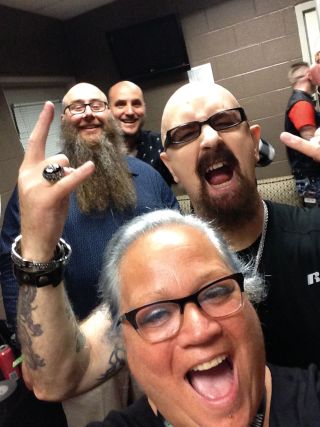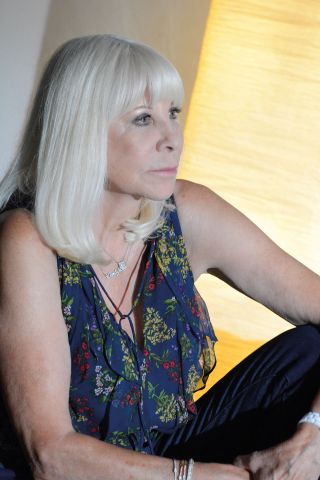Gloria Cavalera is one of the most high-profile women in metal’s history. As manager of Sepultura in the early 90s, she oversaw their transition from a little-known Brazilian band to charting-beating global successes.
Yet her achievements have been diminished in the eyes of men who blame her for Max leaving in 1996, fracturing their favourite band, and she has faced a torrent of misogyny and hatemail.
“I’ve had my fair share of death threats over something that I never even did. I learnt to take that and become stronger,” she says. Just six months ago, a guy sent me a message saying he’s gonna shit on my grave because so-and-so told him what I did in Sepultura. It’s like, what did I do? Sharon Osbourne told me, ‘You are guilty.’ I was like, ‘What for?’ And she goes: ‘Their success.’”
Rock and metal have long been male-dominated. On Hammer’s own Facebook page, 25% of Likes are from women and 75% are from men. Of the 17 bands announced for Bloodstock 2018’s Main Stage, Nightwish is the only one with a female member. In the music industry in general, a survey published by the UK Music Diversity Taskforce last January showed that, between the ages of 25-34, women account for 54% of the workforce – but only 33% between ages 45-64.
Since the Weinstein scandal broke in October 2017, exposing a gender power imbalance in Hollywood, the entertainment industry as a whole has come under increased pressure to put its house in order. So does heavy music have a problem with sexism, and is it affecting women’s careers?
“Women take a lot of crap,” says Gloria. “This whole #metoo thing, do they think it just started? That has gone on since the pictures of the cavemen pulling girls by their hair. Women have always been pushed to the back. I personally think it’s still difficult for women in the industry today, because there’s not a lot of them, even in bands.”
Like Gloria, Wendy Dio is a veteran of the music industry, and started out as a manager 35 years ago. She had been working at Decca Records, for booking agencies, and for attorneys in the music business before she got into management and looked after the career of her husband, Ronnie James Dio.
“I came from a music background before I met Ronnie – in fact, that’s why I met Ronnie,” she explains. “But you know, people don’t think about that. They go, ‘Oh, it’s just his wife, she doesn’t know what she’s doing.’”

Starting out, she remembers arguing with a promoter in the mid-80s, who tried to deduct $1,200 from the fee because of ‘broken chairs’. “I said, ‘Well, can I have them? If I’m paying for them, I would like them!’” she laughs.
“He said, ‘Well, nobody’s asked for them before!’ And then we had this argument back and forth. In the end I said, ‘You know what? $1,200, I spend that on lunch – keep it. You obviously need it more than me.’ And he ended up giving me the money.”
She says she no longer struggles because she’s built up a reputation, and advises women today to keep pushing onwards and do the same. “You just have to slog on, and slog on, and prove that you know what you’re doing,” she offers.
Maria Ferrero also got into the industry in the 80s. As the CEO, President and Publicity Director of Adrenaline PR, she looks after the likes of Lamb Of God, Sabaton and Motörhead’s legacy.
She was a “troubled teen and a suburban kid in reform schools” when she started connecting with people through the penpal section of Metal Forces magazine and visiting a record store called Rock n’ Roll Heaven in East Brunswick, New Jersey.
It was run by Jonny and Marsha Zazula, who set up Megaforce records, which would end up signing Metallica. The pair allowed Maria to help by answering the phone or opening mail.
“I was only exposed to that being the music business, as a family,” she says. “Not the corporate side or the male-dominated side. Until pretty recently, only within the last year-and- a-half to two years, I’ve never been impacted by the fact it’s male-dominated. I never paid attention. But then it became obvious, and I guess I admitted it.
“I was seeing things on social media, like little boys’ gatherings and shit like that. It’s cool, I go out with my girlfriends, too, but I just felt like it’s an industry thing. And seeing record company people, band people, manager people – where are the women? I was like, ‘Maybe this is real! Maybe I’d better just admit it now!’”
She recalls one experience that might be met with outrage were it to happen today. Metallica, Motörhead and Raven came to play a show in New York in 1983, when Maria was 15. It was James Hetfield’s 20th birthday, and he took a picture of Lemmy hugging Maria and her female friend.
“As James is taking the picture, Lemmy grabs my right boob and her left boob, and we’re like, ‘Argh!’” she recalls, with both fondness and incredulity. “And I was underage. I was like, ‘Shit, I hope I don’t get a wart.’ I laughed it off. As long as they’re not luring people into rooms like Harvey Weinstein, stand up for yourself! Women have grabbed guys’ asses, too! But we have to learn from mistakes and move forward.”

As part of the next generation, Creeper keyboardist/vocalist Hannah Greenwood is doing just that – calling out the behaviour that makes her uncomfortable. In November 2016, she took to Facebook to vent about a stage manager in the Netherlands who wouldn’t let her back into the venue during load-out, even though she had an All-Access pass around her neck.
“Sexism is not on. No woman should ever be made to feel that she cannot do something, because of her gender,” she wrote. In December 2017, she Tweeted about an incident that happened at a show in Manchester. She had walked to the front of the stage to sing Darling with frontman Will Gould, when she heard someone call her name.
“Some guy yelled, ‘Hannah, you’ve got a great arse!’” she says. “I heard somebody say my name, but I didn’t hear what he said afterwards; it was only when I came offstage that somebody was like, ‘Did you hear that douchebag yelling that thing about your arse?’ After I Tweeted about it, I found out there was a whole group of guys who were really drunk and making remarks to other girls in the crowd, and grabbing their arses. It pissed all of us off.”
Online, a bunch of fans leapt to Hannah’s defence, and applauded her for speaking up. In a post-Weinstein world, incidents of sexual harassment – from catcalling to groping and beyond – are routinely being called out. Shirley Manson, who rose to fame in the 90s with Garbage and often appeared in these pages, reckons the #metoo movement has been a positive force for young women.
“As sad and awful as the #metoo movement is to bear witness to, it’s also phenomenal and very unique and unusual to hear so many female voices on a daily basis in the media, talking about the female experience and female rebellion,” she says.
“And although it probably won’t change that much, sadly, because I feel like we’ve got such a mountain to climb, I do believe it’s educating a whole generation of young women not to put up with the fucking shit we did.”
When Shirley was younger, she couldn’t always identify sexism, because it coloured her world in insidious ways. “I recognised blatant sexism, but not always covert sexism – ‘encouragement’ to delight the male gaze, and how women are pitted against one another, and how we seem to have been raised with the belief that there’s not room for more than one female artist, and in order to thrive as a female artist you must dazzle,” she explains. “I feel that’s really inaccurate, actually, but it’s taken a long time to realise that.”
But not everyone is sure whether the effects of online discourse are entirely beneficial. Julie Weir, Head of Sony label Music For Nations, acknowledges that we’re living in a patriarchal society, but worries the noise on social media could put women off coming into the industry.
“It’s upsetting that some of the younger girls have got a bit of a chip on their shoulder about being female in the music industry,” she says. “I don’t know if it’s because they see more people talking about it, and it’s a more open thing online. But I think it’s both a good thing and a bad thing; it’s a very grey area.
"Because if people are talking about it, it makes it better, but it also brings it more to the forefront and underlines it. I have honestly always been of the opinion that it’s about being the best human you can be, rather than worry about your gender.”
Julie made connections in the scene before striking out on her own. In the early 90s, she wrote for the University Of Salford’s music magazine while studying sociology and popular culture, and then worked at Nail Records in Leeds (a metal, industrial and hardcore specialist shop).
She moved to London to study film and media, where she became involved with merch at Cacophonous Records and later progressed to label manager. In 1998, she set up Visible Noise Records, looking after the careers of bands such as Bring Me The Horizon and Bullet For My Valentine. Now at Music For Nations, she’s responsible for the likes of Bury Tomorrow and Andrew WK among others.
“There’s all these conversations coming out that it’s really hard to be a woman in the music industry, and I’ve never really experienced that,” she says. “I don’t particularly have that whole ‘feeling sorry for myself because I’m a girl’ thing. I’m an only child anyway, and I’ve always done what I wanted to, so it’s an inherent thing.”
Bloodstock director Vicky Hungerford has an even more forthright attitude. She worked in sales at the Derby Telegraph before her dad, who founded the festival, asked her to help with its increasing workload. In 2005, she took on the role of booking the bands, and works alongside her sister and husband.
“I’m going to sound like the most anti-feminist person now, but I’m not a fan of International Women’s Day. I believe that if we keep perceiving that women are the lesser, then we become that. I think that if you’re good at your job, regardless of whether you have a dick or tits, it doesn’t make any difference,” she says.
While she does acknowledge sexism, she says the answer is to shut it down and move on. “I’ve had the odd sexist thing happen over the years, but I’ve nipped it in the bud,” she says.
“A few years ago, a stagehand didn’t realise who I was and asked my husband if he could have a blow job from ‘that girl over there’, and it was me. I just introduced myself and said, ‘Hi, nice to meet you. I’m Vicky, the promoter of the festival.’ The look on his face was one of, ‘I’d love to be anywhere but here’. It’s how you handle it that makes a difference.”
In 2018 cover stars Nightwish headlined Bloodstock’s Sunday night. Vicky says the festival neither positively nor negatively discriminates when it comes to booking bands featuring women, and she’s never heard any undesirable comments about female musicians from agents, managers, bands, labels or promoters.
“Nightwish were the first band that ever sold us out in the indoor fest in 2003. Within Temptation were the same in 2005. Whenever we’ve had female-fronted bands, they’ve sold us out. Courtesans are going to be supporting King 810, and they played Bloodstock last year. So all these bands are getting the same opportunities.
“I think if people keep banging on about, ‘Is there sexism?’ it’s creating a problem. It’s like if you tell yourself you’ve got small boobs or a fat stomach, you can start being dysmorphic and believing that’s the case, because you’re drumming it into yourself. Maybe we should be positive and just say there’s not a problem.”

If bills are open to all genders, why do so few women feature on rock and metal’s stages? Is it that there simply aren’t enough bands in the pool? What systematic difficulties do women face to get there?
“The whole game of ‘rock’ was designed and maintained by the patriarchy,” says Shirley. “So if the rules are written by men, it makes it very difficult for women to infiltrate. It’s very difficult still for women to be treated as equal thinkers and creators.”
Hannah agrees sexism is still a barrier to entry in heavy music, whether it’s because women are being actively discriminated against at some level or are simply put off trying because of having to “jump the extra hurdle”. But she also thinks representation is an issue. For example, the pop world has a higher proportion of women on stages.
“People always think pop stars are pretty, skinny women with really long hair and amazing makeup, and then rock and metal is kind of like a grungy, boys’ club. And it’s been portrayed that way for so long in the media, I worry that women think they can’t do it,” she says.
Maria and Julie also point to the obvious drop-off that happens across all industries when women have children. “There’s always going to be more male artists, because sadly, biologically, women end up having children and being mums,” says Julie. “There’s only a kind of landslide happening now, where dads can have more time off and take paternity leave, so they can actually split the responsibilities.”
Gloria remembers the challenges of managing Sacred Reich and being on the road when she was a single mother of five. “At first, my daughter Christina would watch the kids and run the office at home. And then I started looking for nannies, in the endless quest of mothers who work.
"I’m a firm believer you can do whatever you want to do, and maybe it takes the most extreme stress on you physically and mentally, but things aren’t easy sometimes. I was born to hardworking parents. My mother was in a concentration camp, and she taught me a lot about what was important.”
If there’s a common thread that emerges from all the women we spoke to, it’s determination. In 2018, there’s a heightened collective awareness of the power structures at work in society, theoretically making it easier to call out sexism in the music industry.
Change takes time, but it is happening, and Julie and Maria point to the exciting new class of bands rising up, such as Code Orange and Venom Prison. It might still take some extra work to succeed, but it can be done.
“Just keep on,” says Wendy Dio. “Especially the musicians. You do what you believe in. Don’t change yourself. And if you’re good enough, you’re gonna make it.”
“Keep climbing and swat the flies off on the way up,” adds Maria. “It’s a hard road, but it’s worth it. Not only to forge your own path, but to clear a path for the people behind.”


